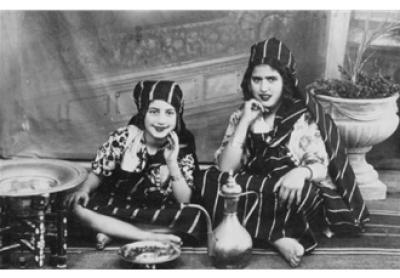
Libya and the Jews: historic moment of truth

The Jerusalem Post reports Aug. 23 that Libya's rebel council has invited the London-based leader of a Libyan-Jewish diaspora group to return to the country and run for office in free elections. Raphael Luzon, the head of Jews of Libya UK, said the invitation came from rebel President Mustafa Abdul Jalil. "They proposed for me to take part in one of the parties because they would like it to be open to all people including women and Jews."
The Benghazi-born Jew, whose family fled Libya following a pogrom in 1967, said he is awaiting further developments. "I said I would accept it once I see it is real democracy and the proposal is offered," he said. "If I do it I do it for one matter: the historical matter. The first Arab country that proposed that a Jew run in a free election."
"As you know we left there 82 synagogues, land and property and I would like to take care of this because it belongs to the Jewish community of Libya," he added.
The Last Jews of Libya website states that Jews have lived in the North African country since Roman times. At its peak in the 1930s, Libya's Jewish community numbered 25,000. But persecution by Fascist Italy in World War II, and a series of state-sponsored pogroms after independence in 1951, caused an exodus—mostly to Israel after 1948. The last Jew in Libya left the country almost ten years ago. A June 18 Associated Press story provided a view of Tripoli's historic Dar al-Bishi synagogue—closed to the public and falling into ruin.
Moammar Qaddafi, after taking power in his 1969 military coup, moved in an ostentatiously anti-Israel direction—until his embrace by the West after he swore off weapons of mass destruction in 2003, and dropped his strident Arab nationalism. (Even before then, in 1996, he expelled 30,000 stateless Palestinians from Libya.) We had a good laugh a few months ago when he ran a New York Times op-ed piece pushing his wacky "Isratine" portmanteau peace plan, in which he blatantly embraced Zionist revisionism (italics added):
It is important to note that the Jews did not forcibly expel Palestinians. They were never "un-welcomed." Yet only the full territories of Isratine can accommodate all the refugees and bring about the justice that is key to peace.
The new regime in Libya now has the opportunity to make a real statement: to welcome back Libya's Jews—while rebuilding Libya's traditional stance of solidarity with the Palestinians, and cutting no slack for Israel's aggressions and illegalities. For the general climate in the Middle East, this is the most salubrious move the new regime could make—restoring moral clarity on a question that has been muddied by years of Israeli propaganda (aided by Palestinian actions that have played into it), and decoupling anti-Zionism from anti-Semitism.
Unfortunately, there have been countervailing signs. In a move unlikely to win the rebels much goodwill in the Arab world, Ahmad Shabani, founder of the new Democratic Party of Libya, appealed for political support from Israel. Shabani said: "We are asking Israel to use its influence in the international community to end the tyrannical regime of Qaddafi and his family." Again, the invocation of Israel's mythic "influence"—coupled with blindness to Israel's own "tyrannical regime" in the Occupied Territories.
Shabani, also based in London, is the son of a former cabinet minister under Libya's king, who was deposed by Qaddafi in '69. So maybe he is not the most progressive figure in the rebel camp. Let's hope more courageous and visionary voices will prevail—reopening Libya to its exiled Jews, while vigorously supporting justice for the exiled and occupied Palestinians.


Comments
Anti-Jewish rally in Libya...
Posted to YouTube by ZintanMedia, an apparent rally against the return of the Jews...
A Jewish renaissance for Libya?
A Reuters story on Oct. 1, "Libyan Jew returns home after 44-year exile," on one man's dream to restore Tripoli's semi-ruined Dar Bishi synagogue:
It goes on to note that he has (not surprisingly) received threats from Qaddafi loyalists.
Libya's Jewish renaissance hits a roadblock —already
The mainstream media have been following Gerbi's efforts, and it seems his efforts to restore the synagogue have been halted by threats. From AP, Oct. 3:
Call for repatriation of Libyan Jews
Ahmed Shebani of Libya's Democratic Party has a piece in the Times of Israe detailing the expuslion of the Libyan Jews in 1967, and calling for their repatriation. "Libya needs her Jews as much as they need her," Shebani writes.